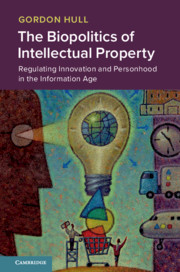 The Biopolitics of Intellectual Property
The Biopolitics of Intellectual Property Published online by Cambridge University Press: 01 November 2019
This chapter both provides a condensed case for why the analysis of intellectual property (IP) through differing regimes of power is a fruitful one, and details a couple of its implications. One is that we need to be attentive to the way IP law creates certain kinds of subjects, and to be willing to critique it on those lines.The other takes the form of a brief discussion of alternatives proposed to IP, in such areas as “low IP” zones and in creative commons-style proposals.I conclude that the degree to which these alternatives fundamentally challenge the neoliberalization of IP and its move away from public biopower, is essential in assessing the extent to which they actually are alternatives.The goal is not to be strongly prescriptive, but, in the manner of Foucault, to help figure out what are the right questions to ask.
To save this book to your Kindle, first ensure no-reply@cambridge.org is added to your Approved Personal Document E-mail List under your Personal Document Settings on the Manage Your Content and Devices page of your Amazon account. Then enter the ‘name’ part of your Kindle email address below. Find out more about saving to your Kindle.
Note you can select to save to either the @free.kindle.com or @kindle.com variations. ‘@free.kindle.com’ emails are free but can only be saved to your device when it is connected to wi-fi. ‘@kindle.com’ emails can be delivered even when you are not connected to wi-fi, but note that service fees apply.
Find out more about the Kindle Personal Document Service.
To save content items to your account, please confirm that you agree to abide by our usage policies. If this is the first time you use this feature, you will be asked to authorise Cambridge Core to connect with your account. Find out more about saving content to Dropbox.
To save content items to your account, please confirm that you agree to abide by our usage policies. If this is the first time you use this feature, you will be asked to authorise Cambridge Core to connect with your account. Find out more about saving content to Google Drive.